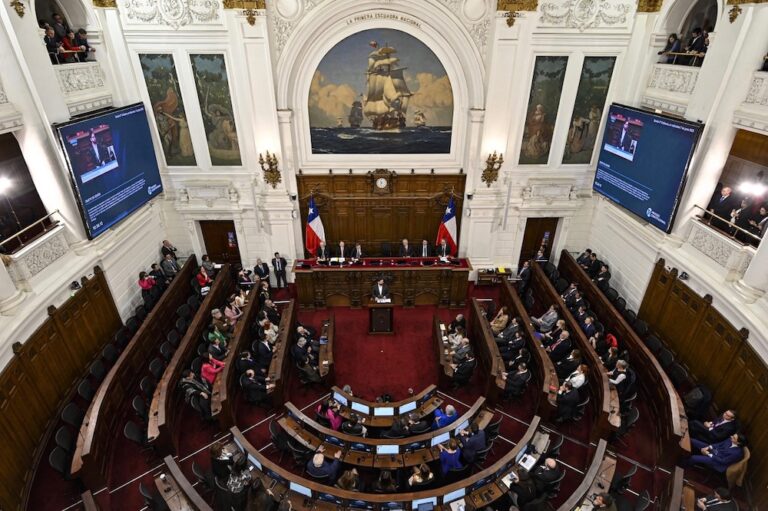(WPFC/IFEX) – The following is a 21 January 2005 WPFC letter to Senate President Hernán Larraín Fernández: Washington, USA, Jan. 21, 2005 His Excellency Sen. Hernán Larraín Fernández President of the Senate Valparaíso, Chile Your Excellency: For more than two years, World Press Freedom Committee (http://www.wpfc.org) has been urging the Chilean Congress to pass a […]
(WPFC/IFEX) – The following is a 21 January 2005 WPFC letter to Senate President Hernán Larraín Fernández:
Washington, USA, Jan. 21, 2005
His Excellency Sen. Hernán Larraín Fernández
President of the Senate
Valparaíso, Chile
Your Excellency:
For more than two years, World Press Freedom Committee (http://www.wpfc.org) has been urging the Chilean Congress to pass a bill eliminating your country’s insult laws. Finally, your Constitution, Legislation, Justice and Rules Committee, after more than a year of delays, issued its recommendation to be considered by the full Senate. And the results are disappointing.
These 27 months of debates, delays, comings and goings have left Presidential Bill #212-347 practically unrecognizable. President Lagos’s initiative proposed the complete elimination of the crime of insult (or “desacato”), quite justly calling it unconstitutional, arbitrary and obsolete. What your Committee has presented to the full chamber is a lamentable document that still leaves 15 million Chileans at the mercy of a select group of public officials protected by these laws.
We do acknowledge that the bill submitted to the full Senate eliminates the word “desacato” and derogates or eliminates two of the three insult articles in the Criminal Code, Articles 263 and 265. Nevertheless, the wording of the first paragraph of Art. 264 leaves the door wide open to very ample interpretations of what it means to threaten a public official and extends the scope of the original law by protecting any public official who may feel threatened. In other words, the spirit of desacato remains in the law and, moreover, its intimidating power has been reinforced.
Likewise, contravening President Lagos’s Bill, the four desacato articles in the Code of Military Justice (276, 284, 416 y 417) have been left practically intact, except for the fact that the corresponding fines have been increased. Also, the Committee upheld that any civilian, including of course any journalist, must be judged in military court if such a person is accused of violating any of these Code of Military Justice articles. This decision contradicts President Lagos’s Bill, the version passed by the Chamber of Deputies, current legislation, and the basic norms of democracy and governance.
All these provisions in the Committee’s Bill are preceded by conflicting statements, like this one: “It does not seem reasonable to bestow an unjustified right on certain public officials in order to protect their honor, a privilege that is not shared by the rest of the members of society.”
Further, the Bill concludes the following: “The existence of these norms is not coherent with the functioning of a modern democratic state (. . .) The intimidating power of the sanctions that these laws carry keeps free debate and the exercise of journalistic investigation from developing fully.”
The bill also defends the elimination of desacato “because it constitutes an illegitimate restriction to the exercise of the freedoms of thought, opinion and information.”
Regardless of all these commendable words, by virtue of this Bill, the crime of desacato, not by name but de facto, remains current in Chile, in an open challenge to the American Convention on Human Rights, of which your country is a signatory, and the recommendations of the Inter-American system of human rights.
This is why, Mr. President, we urge the full Senate to reject recommendation #3.048-07 submitted by the Constitution, Legislation, Justice and Rules Committee, and urge the members of your Committee to write a new Bill according to the principles of Presidential Bill #212-347, which was originally submitted to Congress by President Lagos.
The Chilean Senate has a magnificent opportunity to push the country into the vanguard of the community of nations that respect a free and independent media. To accept the current recommendation to reform the desacato laws would be a lamentable setback in this respect.
Respectfully,
E. Markham Bench
Executive Director
World Press Freedom Committee
(http://www.wpfc.org)


